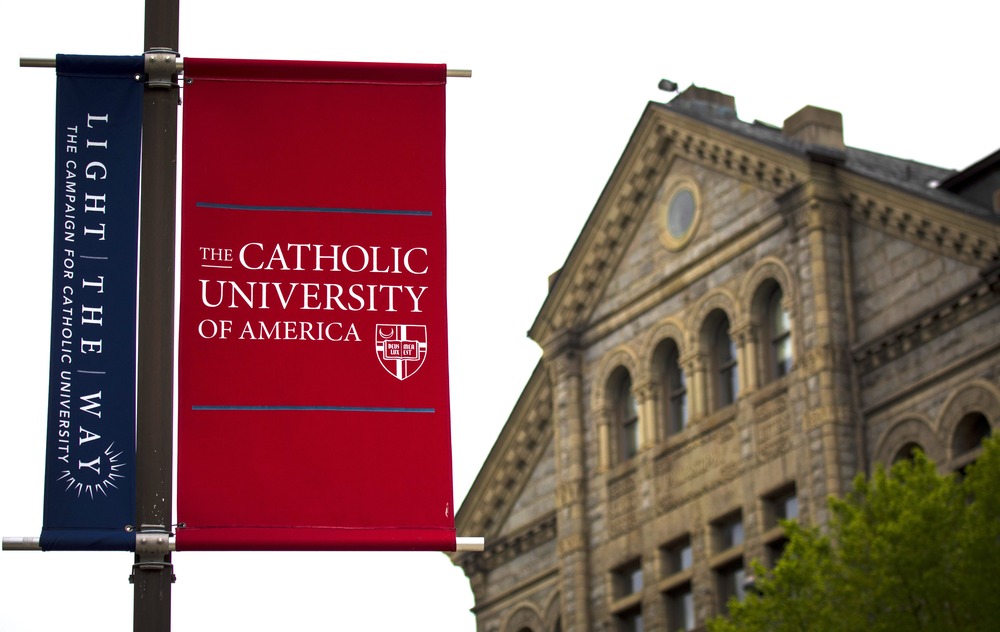
The Washington campus of The Catholic University of America is shown May 18, 2020. The university is facing a "structural deficit of $30 million" that the school "must address through both budget cuts and revenue growth," said president Peter Kilpatrick in a Dec. 6, 2024, email to alumni. (OSV News/CNS file, Chaz Muth)
The Catholic University of America is facing a "structural deficit of $30 million" that the school "must address through both budget cuts and revenue growth," said president Peter Kilpatrick in a Dec. 6 email to alumni.
Kilpatrick pointed to a number of challenges in the nation's higher education landscape, citing "rising costs and increased competition for students."
He also cited the impact of COVID, inflation and the "poorly redesigned" FAFSA (Free Application for Federal Student Aid) form.
An overhauled version of the form — required for students applying for federally funded student aid — was rolled out by the U.S. Department of Education in December 2023 amid at least 55 technical problems, including simple bugs such as signatures disappearing from the online document.
Kilpatrick said that starting last March, the university, acting upon the recommendation of its trustees, "began to make some immediate and difficult budgetary adjustments" to ensure the school's "long-term financial strength and resilience."
He said the school — which depends heavily on tuition revenue — would work to eliminate its "undue reliance on financial reserves and investment payouts to balance the budget."
Kilpatrick admitted that while enrollment saw an uptick over the past two years, the growth was still short of "our ambitious enrollment targets this year.
"As an enrollment-driven institution, this affects our revenue," he said. "For the past decade, we have bridged such gaps through transfers from financial reserves — a practice we must now cease in order to ensure long-term sustainability."
In a Dec. 18 follow-up email to the university community, the university's board of trustees chair Robert Neal stressed that the challenges confronting the school are "significant but surmountable.
"Our current deficit requires decisive action, and while the necessary changes will not be easy, they are essential to preserve and strengthen our university’s mission," he said, adding that "this once-in-a-generation restructuring is about positioning Catholic University for future growth."
Neal also pledged to maintain "transparency throughout this difficult process."
Advertisement
The university is far from alone in its financial difficulties, with at least 16 U.S. nonprofit colleges and universities — many of them dependent on tuition, rather than endowments — shuttering in 2024. In 2023, at least 14 schools closed, with researchers from the Federal Reserve Bank of Philadelphia projecting the trend to accelerate in the next five years.
In December, Federal Reserve scholars released a report on "Predicting College Closures and Financial Distress," observing that long-term trends and the post-pandemic recovery have created "serious financial headwinds" for the nation's postsecondary education sector.
Enrollment fell 15% from 2010 to 2021, and although the fall 2023 semester "saw the first across-the-board increase in enrollment in many years," downturns in the overall number of graduating U.S. high school seniors — higher education's anticipated "demographic cliff" — accounts for a "sizeable portion" of the waning enrollment trends, said the researchers.
In addition, said the Federal Reserve report, fewer high school graduates are enrolling in college upon graduation, with the rate sliding from 70% to 62% over the past decade.
"This decline, which also began before the pandemic, could reflect growing skepticism among the public about the value of higher education," said the researchers.
Kilpatrick said the school has "already identified ways to save more than $20 million in expenses that protect our core mission," noting that the cost-saving measures would be evaluated by two committees that together would provide "detailed analysis and broad community input."
He also pointed to the university's "strong foundations" for "growth opportunities" — among them, a "state-of-the-art nursing and sciences building," a five-year NASA research partnership for $110 million, and a $31 million contract from the Department of Energy on nuclear waste vitrification, a disposal method that converts the waste into a glass matrix form for safer disposal.
Rounding out the university's efforts are new marketing initiatives to raise the school's profile, and partnerships with dioceses and alumni networks "to drive applications on the local level," said Kilpatrick.
"Our faculty and staff remain deeply committed to providing our students the highest caliber of Catholic education, and are actively pursuing additional operational efficiencies and opportunities for growth," he said. "I am confident that Catholic University will emerge from this period stronger and better positioned to fulfill our mission of forming the next generation of leaders."







